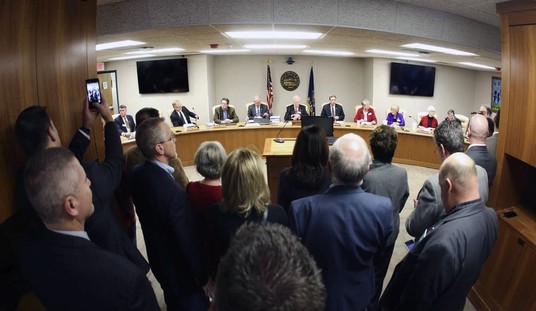Gingrich, we are told by his supporters, is the true heir to the Reagan legacy of conservatism. But is that really true? Evidence suggests that Gingrich may not have agreed with Reagan on the bedrock of conservatism, limited government.
In an unnoticed 1992 speech, Newt Gingrich in a single utterance took aim not only at a beloved conservative icon but also at a core tenet of the conservative movement: that government must be limited.
Ronald Reagan’s “weakness,” Gingrich told the National Academy of Public Administration in Atlanta, was that “he didn’t think government mattered. . . . The Reagan failure was to grossly undervalue the centrality of government as the organizing mechanism for reinforcing societal behavior.”
A review of thousands of documents detailing Gingrich’s career shows it wasn’t the first time he had criticized Reagan, whom he regularly invokes today in his campaign for the Republican presidential nomination. When Gingrich was in the House, his chief of staff noted at a 1983 staff meeting that his boss frequently derided Reagan, along with then-White House Chief of Staff James A. Baker III and Robert H. Michel, the House Republican leader.
Gingrich “assumed that he’s the whole Republican Party,” said the Gingrich aide, Frank Gregorsky, according to a transcript of the meeting. “He knows more than the president, the president’s people, Michel, Baker. He calls them stupid all the time, and I think that’s going to get him into big trouble someday.”
This is far from the first suggestion that Gingrich isn’t a real Reagan fan. It’s been suggested on Bloomberg before, but before you start thinking it’s just a left-wing hit piece on Newt, it’s also been discussed here on the Tatler, as well as at National Review. Seems there’s quite a few people across the ideological spectrum questioning whether or not Newt was really as big a supporter of Reagan as he’d like the voters to think now.
Further, as much as conservatives have questioned Romney’s move to the right, it looks like Gingrich made a similar journey:
An examination of the papers collected over nearly three decades reveals a politician of moderate-to-liberal beginnings, a product of the civil rights era who moved to the right with an eye on political expediency — and privately savaged Republicans he was praising in public. Even as he gained a reputation as a conservative firebrand, the documents show Gingrich was viewed by his staff primarily as a tactician — the “tent evangelist” of the conservative movement, one staffer said — with little ideological core.
And there’s also evidence that Gingrich has a problem with ego, which would explain some of his weirder statements on the campaign trail this year:
The files offer a candid glimpse of the former House speaker, a man who could be charming and self-effacing one moment, ambitious and grandiose the next, an admittedly disorganized manager who viewed his role as nothing less than saving the Western world.
“When I say save the West, I mean that,” Gingrich said in a 1979 address to his congressional staff, preserved in the files. “That is my job. . . . It is not my job to win reelection. It is not my job to take care of passport problems. It is not my job to get a bill through Congress. My job description as I have defined it is to save Western civilization.”
The Speaker of the House, saying it’s not his job to get a bill through Congress? I thought that was exactly what a major part the Speaker’s job was. That statement is akin to a doctor saying his job isn’t to see patients.
Is this the kind of man we want going against possibly the biggest narcissist in American presidential history? That’s the open question. Judging from the recent primary results, I’d say the voters are saying no.









Join the conversation as a VIP Member